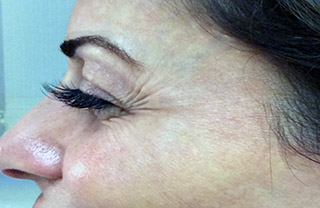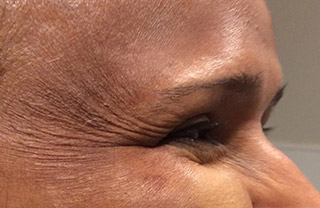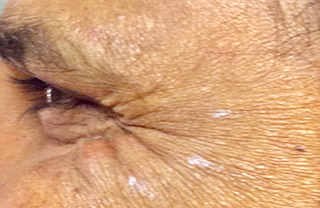Crows Feet
They squint in exasperation, crumple in disgust, and deepen with joy. They’re teeny — less than a centimetre wide — but they can be a source
of endless frustration or a point of pride. They’re the result of a muscle twitch that’s as uncontrollable as it is fleeting, but whether they’ve sent us to the dermatologist in a panic or reminded us of our mother’s laugh, they’re part of who we are. They go by unpronounceable names (orbicularis oculi contractions) and cryptic ones (Duchenne markers). But the most common, the most weighted, is crow’s-feet. And they’re more complicated, more nuanced than we ever thought.
When people come in wanting to get rid of their crow’s-feet, I really contemplate whether this is the best choice. More than any other wrinkle, crow’s-feet are expressive. I often say, ‘Trying to emote without facial expressions is like trying to text without emojis’. And OK, technically they’re less a red-dress dancing lady and more of
TREATMENTS
Summarising above I’ll encourage you to use OBAGI
MESOTHERAPY
The next step will be MESOTHERAPY.
HYDROBOOSTER
Dependable on the depth of your wrinkle, the consultation will determine whether you are the right candidate for the treatment.
BTX
BTX injections for no expression or just a moderate one, called Baby BTX. The procedure takes 3 small injections, on each side, with just a smaller amount of BTX Units then it would take to keep your “frozen look”.



Ready to Make a Change?
Please click a one of the buttons on the right to see all of our treatments and what conditions they treat.
Prevention
Unlike other treatments I really want you to smile with your lips and eyes, although sometimes you might like to:
Control your face muscles
Smile only gently
Relax more often
Get a face massage
Make sure you have the appropriate skin routine at the morning and evening.
Every day counts!
Meditate for 10 min
Avoid direct sun exposure.
Keep your hands clean
Do not smoke
Avoid alcohol
Eat well, eat organic!
Take your skin supplements like it is your religion.
Exercise, do what you like but keep moving!
Find the time to relax
Moisturise your skin well before sleep
Get your 8 hours sleep
Meditate before sleep
More about Crows Feet
Crow’s-feet are so important in psychology, that there’s a name for them: Duchenne markers. “When you see someone smile, you tend to make a distinction between genuine smiles — which we call Duchenne — and sham
Amazingly, studies of yearbook pictures, politicians’ headshots, and dating profile photos show that deep crow’s-feet are good predictors of lower divorce rates, election victories, and how wealthy people think you are, respectively. The senior author of the your-wrinkles-make-you-look-rich study, Nicholas Rule, an associate professor of psychology and the Canada Research Chair of the social perception and cognition laboratory at the University of Toronto, explains: “The emotional expressions you’ve been making all your life come to be reflected in your face, and crow’s-feet are very important in expression. They signal you’re happier overall and, in this case, that you’re wealthier because you’ve been contented and smiling much of your life.” In another study, women who reported experiencing a particular emotion frequently throughout their life looked like that emotion by the age of 68; “it’s especially noticeable for happiness, possibly because of crow’s-feet,” says Todorov.
“We try to recast how people think about crow’s-feet. I say, ‘Your crow’s-feet are the story of who you are, of all your laughter and joy over the last 40 years,'” says Hirsch. “Crow’s-feet speak of a joyous life laughing, and that is truly beautiful.”